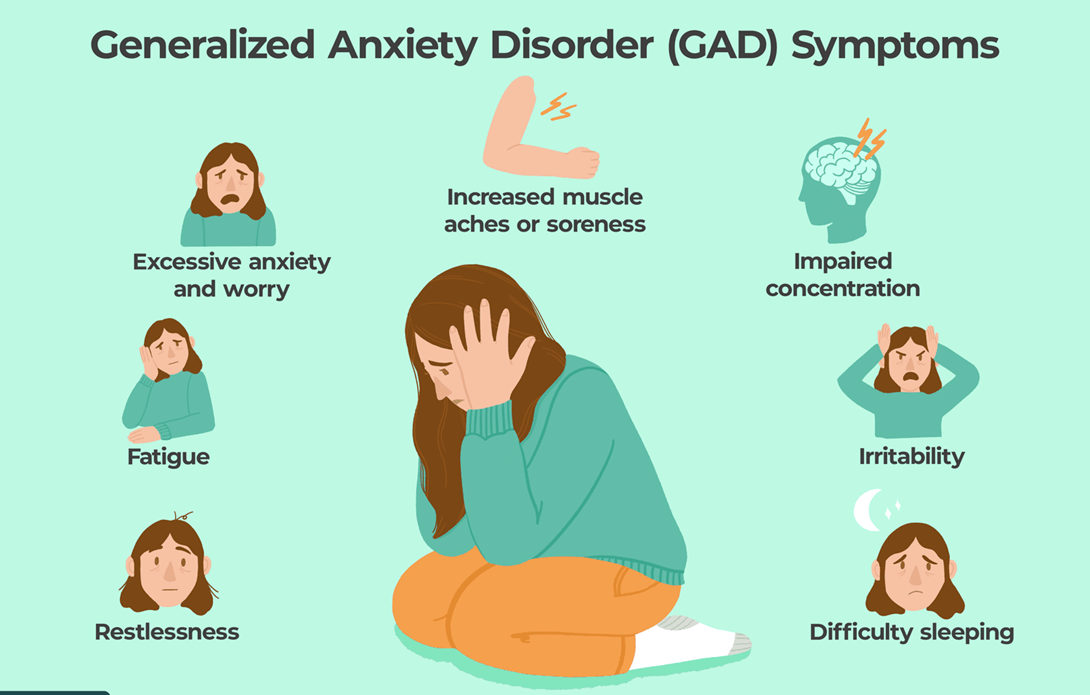A college student has been diagnosed with Generalized Anxiety Disorder (GAD). Which of the following symptoms should a campus nurse expect this client to exhibit? Select all that apply.
Hyperventilation
Irritability
Anorexia
Insomnia
Fatigue
Correct Answer : A,B,D,E
Choice A: Hyperventilation
Hyperventilation is rapid breathing that usually occurs because of anxiety or panic. This leads to low levels of carbon dioxide in your blood which causes a number of symptoms. Hyperventilation in anxiety can be a tricky thing to understand. On one hand, it can feel like you're suffocating or not getting enough air. On the other hand, hyperventilation can also cause shortness of breath, chest pain, and lightheadedness.
Choice B: Irritability
Irritability is a common symptom of Generalized Anxiety Disorder (GAD). Individuals with GAD often experience severe feelings of fear and unease and report feeling restless and irritable that interfere with the quality of their life.

Choice C: Anorexia
While there is a relationship between anxiety disorders and anorexia nervosa, anorexia is not a common symptom of Generalized Anxiety Disorder (GAD). Anorexia nervosa is a separate disorder that involves a fear of gaining weight and a distorted body image.
Choice D: Insomnia
Insomnia is highly prevalent in psychiatric disorders, and it has significant implications. The anxiety that characterizes GAD often interferes with the ability to sleep and leads to insomnia. This is not unexpected. Anxiety might be viewed as an inappropriate escalation of a response called arousal.
Choice E: Fatigue
Fatigue is a common symptom of Generalized Anxiety Disorder (GAD). Individuals with GAD may feel restless and have trouble relaxing. They may also tire easily or feel tired all the time.
Nursing Test Bank
Naxlex Comprehensive Predictor Exams
Related Questions
Correct Answer is D
Explanation
Choice A reason: Acrophobia is the fear of heights, not water, and is considered a natural environment type of phobia.
Choice B reason: Aquaphobia is indeed the fear of water, but it is classified as a natural environment type of phobia, not situational.
Choice C reason: Acrophobia is incorrectly associated here; it is the fear of heights and not related to water.
Choice D reason: Aquaphobia is the correct term for an excessive fear of water, and it is identified as a natural environment type of phobia?.
Correct Answer is ["B","C","D","E"]
Explanation
Choice A reason: Persistently asking the same question can increase agitation in clients with dementia.
Choice B reason: Allowing ample time for responses can reduce pressure and agitation in clients with dementia.
Choice C reason: Simple questions are easier for clients with dementia to understand and respond to.
Choice D reason: Providing simple explanations can help clients with dementia understand the purpose of the questions.
Choice E reason: Taking frequent breaks can help prevent fatigue and agitation during the assessment process.
Whether you are a student looking to ace your exams or a practicing nurse seeking to enhance your expertise , our nursing education contents will empower you with the confidence and competence to make a difference in the lives of patients and become a respected leader in the healthcare field.
Visit Naxlex, invest in your future and unlock endless possibilities with our unparalleled nursing education contents today
Report Wrong Answer on the Current Question
Do you disagree with the answer? If yes, what is your expected answer? Explain.
Kindly be descriptive with the issue you are facing.
